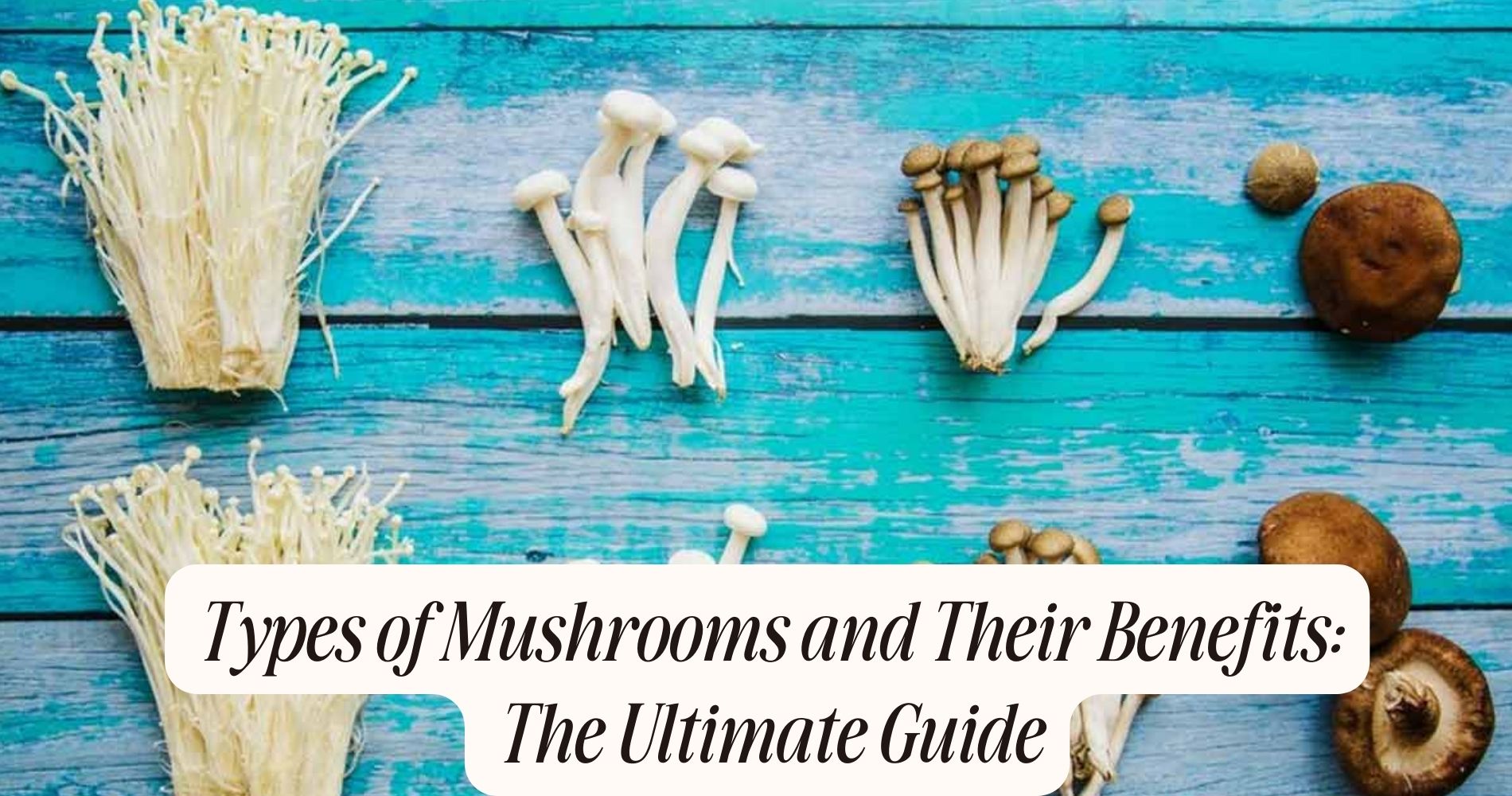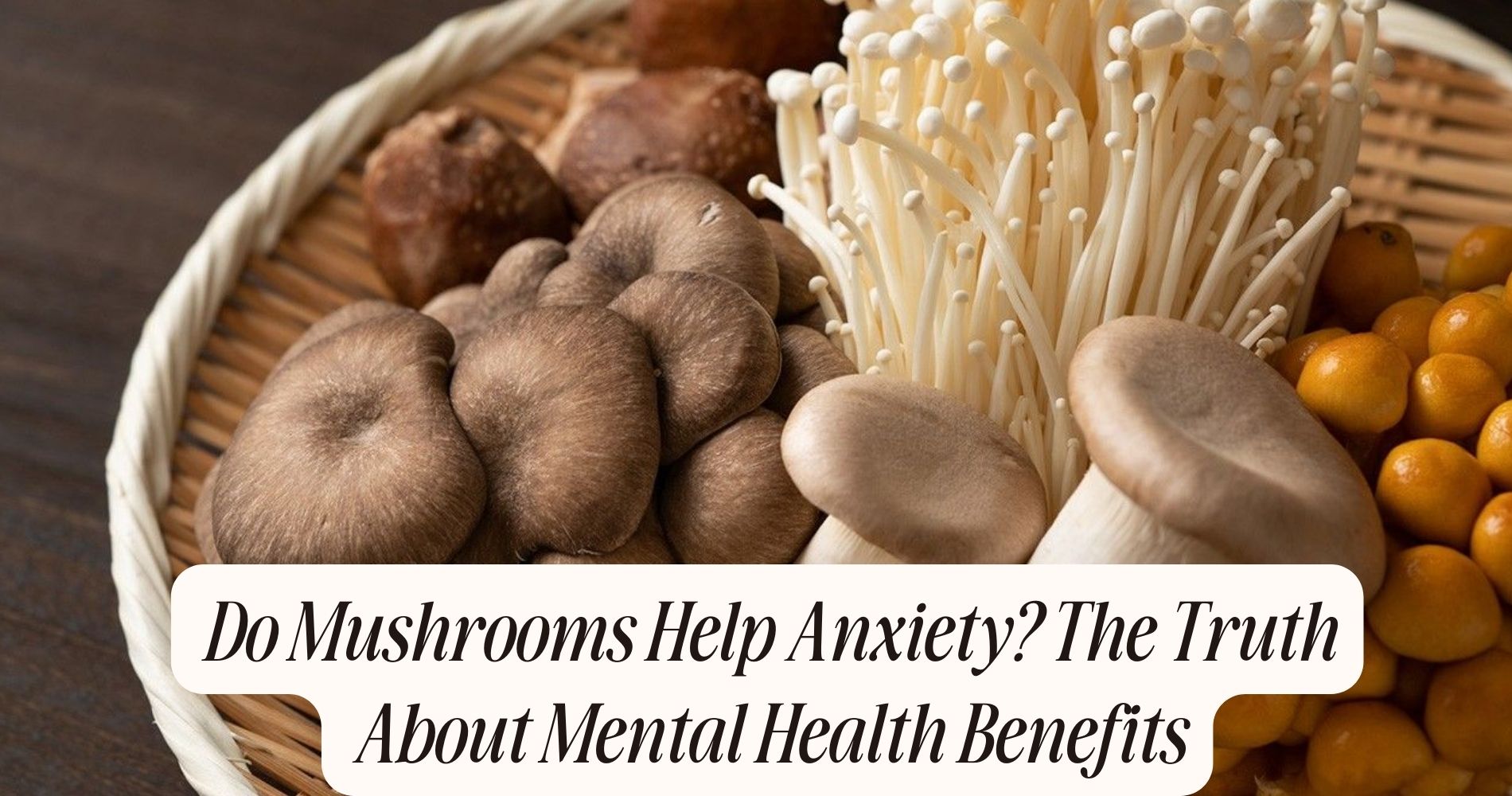
Types of Mushrooms and Their Benefits: The Ultimate Guide
Mushrooms are a powerhouse of nutrition, each offering unique advantages. Exploring types of mushrooms and their benefits can help you make informed dietary choices. Button mushrooms deliver antioxidants for cellular protection, while shiitake mushrooms support immune function and heart health. Portobello mushrooms aid in cholesterol reduction, and oyster mushrooms provide essential amino acids with antibacterial properties. Maitake mushrooms contribute to metabolic health, and reishi mushrooms are known for their potential wellness-boosting effects. Dive deeper to uncover how these incredible fungi can enhance your well-being.
Button Mushrooms: A Versatile Staple
Button mushrooms, often known as the most ubiquitous type of mushroom, are a staple in various culinary traditions due to their mild flavor and adaptability. Scientifically identified as Agaricus bisporus, these fungi offer numerous benefits.
Rich in antioxidants, they contribute to cellular protection and immune function enhancement. You'll find them in many button mushroom recipes that emphasize their low-calorie content, making them perfect for weight management.

Incorporating button mushrooms into your diet provides essential vitamins such as B2 and B3, aiding in energy metabolism. Moreover, they contain selenium, vital for maintaining a robust immune system.
Research suggests their polysaccharides may help in modulating immune responses. By exploring button mushroom recipes, you guarantee a versatile approach to incorporating these nutritional powerhouses into your meals.
Shiitake Mushrooms: A Flavorful Powerhouse
As you explore the diverse world of mushrooms, shiitake mushrooms emerge as a flavorful powerhouse with significant health benefits. Rich in polysaccharides, particularly lentinan, they bolster your immune system and exhibit potential antitumor properties.
Shiitake nutrition includes essential amino acids, vitamins like B2, B6, and D, and minerals such as selenium and zinc, contributing to metabolic and immune function.
Incorporating shiitake recipes into your diet can enhance your culinary experience while providing health advantages. Their umami-rich flavor intensifies dishes like stir-fries, soups, and risottos.
Research indicates that regular consumption may aid cardiovascular health by reducing cholesterol levels and improving arterial function. So, by selecting shiitake mushrooms, you're not just adding flavor, but also nourishing your body scientifically.

Portobello Mushrooms: A Meaty Alternative
Among the many varieties of mushrooms, portobello mushrooms stand out as a robust, meaty alternative to traditional protein sources. Their substantial texture and umami-rich flavor make them a popular choice in vegetarian cuisine.
Scientifically known as Agaricus bisporus, portobellos are mature cremini mushrooms, characterized by their large caps. Portobello nutrition is significant; they're low in calories yet high in essential nutrients like potassium, phosphorus, and selenium. These compounds contribute to cellular function and antioxidant defense.
Research highlights their potential to reduce cholesterol levels, given their fiber content.
When exploring portobello recipes, you'll find they mimic the texture of meat, making them ideal for grilling or stuffing. This versatility guarantees they're an excellent addition to any balanced diet.
Oyster Mushrooms: A Delicate Delight
Oyster mushrooms, known scientifically as Pleurotus ostreatus, captivate culinary enthusiasts with their delicate texture and subtle flavor.
They're a favorite in oyster mushroom recipes due to their adaptability and ability to absorb accompanying flavors. Rich in essential nutrients, oyster mushroom nutrition includes high protein content, essential amino acids, and a range of vitamins such as B1, B2, and B3.
These mushrooms also provide minerals like zinc, iron, and potassium, contributing to overall health benefits.

Research highlights oyster mushrooms' bioactive compounds, which exhibit antioxidant, antibacterial, and anti-inflammatory properties.
When incorporating them into your diet, consider sautéing or grilling to enhance their natural umami. Their mild taste complements diverse cuisines, offering a versatile ingredient for innovative gastronomy.
Chanterelle Mushrooms: A Nutty Treasure
Chanterelle mushrooms, scientifically known as Cantharellus cibarius, are esteemed for their distinctive nutty flavor and vibrant golden hue. When you begin your chanterelle foraging, you'll find these fungi thrive in symbiotic relationships with trees, often in coniferous forests.
They're nutrient-rich, containing high levels of vitamin D and essential amino acids, which contribute to their health benefits.
Incorporating chanterelles into your diet can be quite rewarding. Chanterelle recipes often emphasize their unique taste, enhancing dishes like risottos, soups, and sautés. Their robust flavor profile pairs well with garlic, thyme, and cream-based sauces.
Research suggests they possess anti-inflammatory properties, providing an additional incentive to include them in your culinary repertoire. Foraging responsibly guarantees these mushrooms remain a sustainable treasure for future generations.
Enoki Mushrooms: A Crunchy Twist
Moving from the nutty allure of chanterelles, we encounter the crisp appeal of enoki mushrooms, scientifically known as Flammulina velutipes.
These slender fungi, hailing from East Asia, are celebrated for their unique texture and subtle flavor. Enoki mushroom benefits include their rich source of antioxidants, aiding in immune system enhancement and potential cancer prevention, as supported by recent studies.
They're also low in calories but high in protein, making them a nutritious addition to your diet.
When exploring Enoki mushroom recipes, consider their versatility in soups, salads, and stir-fries.
Their crunchy texture remains intact even when cooked, providing a delightful contrast in dishes. Incorporating enoki mushrooms into your meals not only elevates flavor but also boosts nutritional value.
Maitake Mushrooms: A Frilly Superfood
Maitake mushrooms, scientifically known as Grifola frondosa, stand out with their distinctive frilly appearance and robust nutritional profile.
These fungi are rich in beta-glucans, compounds that enhance immune function and demonstrate antitumor properties in clinical studies. Research indicates maitake benefits include improved cholesterol levels and blood sugar regulation, making them particularly valuable for metabolic health.

They're also a significant source of essential vitamins like D and B-complex, alongside minerals such as potassium and phosphorus.
Incorporating maitake into your diet is simple with a variety of maitake recipes available. You can sauté them with garlic and herbs, add them to soups for a nutritious boost, or include them in stir-fries for a savory, health-enhancing dish.
Morel Mushrooms: A Gourmet Gem
Although often elusive, morel mushrooms (Morchella spp.) captivate both culinary enthusiasts and mushroom hunters with their unique honeycomb appearance and earthy flavor.
These fungi thrive in temperate forests, particularly in areas disturbed by fire, making morel hunting a seasonal pursuit demanding patience and skill.
Scientifically, morels are ascomycetes, and their ecological role in nutrient cycling and symbiotic relationships with trees is well-documented.
When it comes to culinary uses, morels are prized for their umami-rich profile, enhancing dishes with complex depth.
They're best when sautéed in butter or used in creamy sauces, as these methods highlight their distinctive taste.
Rich in vitamins D and B, morels also provide a nutritious boost, making them a gourmet gem in both taste and health.
Reishi Mushrooms: A Medicinal Marvel
Renowned for their therapeutic potential, reishi mushrooms (Ganoderma lucidum) have been celebrated in traditional medicine for centuries. You'll find reishi benefits encompass immune modulation, anti-inflammatory properties, and potential anti-cancer effects, supported by numerous studies.
The bioactive compounds, triterpenoids and polysaccharides, play an essential role in these health-promoting effects.
When considering reishi cultivation, you need to focus on controlled environments, as they typically grow on hardwood logs under specific humidity and temperature conditions.

Cultivating these mushrooms isn't just about health benefits; it also provides an eco-friendly approach to sustainable agriculture.
As research expands, understanding reishi's full potential could revolutionize holistic health practices.
For those seeking natural wellness solutions, incorporating reishi into your lifestyle might be a beneficial choice.
Elevate Your Wellness with SUPER MUSHROOM GUMMIES
Looking for an effortless way to enjoy the benefits of multiple mushrooms? SUPER MUSHROOM GUMMIES by Well Gummies make it easy! Packed with 10 functional mushrooms, including Lion’s Mane, Reishi, and Chaga, these delicious wild berry-flavored gummies support calm energy, sharper focus, and immune balance—without the jitters or crash. Enjoy the power of mushrooms in a convenient chewable form and fuel your mind and body naturally. Try them today and experience the difference!
Frequently Asked Questions
Are There Any Mushrooms That Are Unsafe for Pets?
Yes, some mushrooms are toxic to pets. You must guarantee pet safety by avoiding Amanita, Galerina, and Gyromitra species. Research shows these mushrooms contain compounds that can cause severe liver damage or neurological issues in animals.
How Should Mushrooms Be Stored for Maximum Freshness?
To maximize freshness, store mushrooms in a paper bag in the fridge. This technique regulates moisture, preventing spoilage. Avoid plastic; it traps humidity. Research indicates this method preserves mushroom freshness by maintaining ideal storage conditions.
What Are the Signs of Spoiled Mushrooms?
You should look for signs of spoilage like dark, slimy surfaces, and a strong, unpleasant odor. Mushrooms lose freshness when they become discolored or feel mushy. Research shows their texture and smell are key spoilage indicators.
Can Mushrooms Be Grown Indoors All Year Round?
You can definitely achieve indoor cultivation of mushrooms for year-round growth. By controlling variables like temperature, humidity, and light, you create ideal conditions for continuous production, supporting ongoing mycelial activity and consistent fruiting cycles across various species.
Are There Any Mushrooms That Can Help With Mental Health?
Psychedelic mushrooms, like Psilocybe cubensis, and medicinal mushrooms, such as Lion's Mane, can positively impact mental health. Research indicates they may improve mood disorders and cognitive functions by promoting neurogenesis and modulating neurotransmitter systems.
Conclusion
In exploring the diverse world of mushrooms, you've discovered their unique flavors and impressive health benefits. Button mushrooms offer versatility and essential nutrients, while shiitake and maitake provide immune-boosting compounds. Portobello serves as a hearty meat substitute, and oyster mushrooms deliver delicate textures. Chanterelle and morel add gourmet flair, rich in antioxidants. Enoki brings a crunchy element, and reishi is renowned for its medicinal properties. Embrace these fungi to enhance culinary experiences and support overall health.




